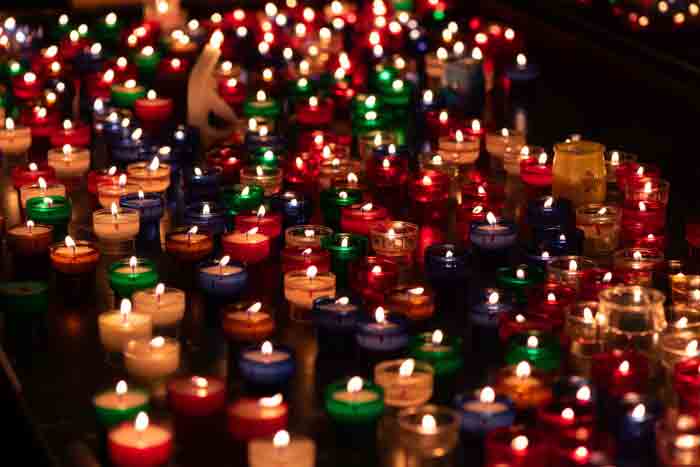IELTS Speaking Part 2: IELTS Cue Card
Describe a traditional festival (or tradition) that is important in your country.
You should say:
When the festival occurs?
What you do during it?
What you like or dislike about it?
And explain why this festival is important?
Note: You will have to talk about the topic for one to two minutes. You have one minute to think about what you are going to say. You can make some notes to help you if you wish.
Table Of Contents
Model Answer 1:
Introduction:
India is a land of diverse cultures and traditions, and Diwali is one of the most vibrant and colorful festivals celebrated in the country. Also known as the festival of lights, Diwali is a time of joy and togetherness when people celebrate the triumph of good over evil and light over darkness.
When the festival occurs?
Diwali usually occurs in October or November and lasts for five days. The exact date of the festival is determined by the Hindu lunar calendar.
What you do during it?
During Diwali, people light small clay lamps(diya) and decorate their homes with rangoli (colorful designs made with rice flour or colored powder) and burst firecrackers.
They also exchange gifts and sweets with friends and family. Many people also worship Goddess Lakshmi, the goddess of wealth and prosperity.
What you like or dislike about it?
One of the things I like about Diwali is the sense of community and togetherness it brings. People come together to celebrate and share in the festivities.
The decorations and lights create a beautiful and festive atmosphere. However, the noise and air pollution caused by firecrackers can be a downside.
And explain why this festival is important?
Diwali is an important festival because it celebrates the victory of good over evil and light over darkness. It is also a time for new beginnings, as people clean their homes and wear new clothes.
For Hindus, Diwali is very important because it marks the return of Lord Rama to his home in Ayodhya after he defeated the demon king Ravana. There are also other stories from Hindu mythology that are associated with Diwali.
For Sikhs, Diwali is also significant. It celebrates the release of their sixth guru, Guru Hargobind Ji, and 52 princes from prison in 1619. The Sikh tradition tells us that Emperor Jahangir had imprisoned Guru Hargobind Ji and the princes.
The Emperor agreed to release Guru Hargobind Ji, but the Guru asked for the princes to be released too. This event is remembered by lighting up the Golden Temple.
Conclusion:
Overall, Diwali is a joyous occasion that brings people together to celebrate light, love, and new beginnings.
IELTS Speaking Part 3 : Follow up Questions
Here some examples of follow up questions that you may asked during your speaking part 3 by examiner related to cue card “describe a traditional festival (or tradition) that is important in your country”.
1. Are traditional holidays disappearing?
Traditional holidays are not disappearing completely, but they are undergoing transformations in response to societal changes. Modernization, globalization, and shifting cultural dynamics have influenced the way people celebrate these holidays. While some traditions may be modified or adapted, many traditional holidays still hold importance and continue to be celebrated, albeit with variations. Efforts are being made to preserve cultural heritage and promote the observance of traditional holidays through educational programs, cultural initiatives, and community events.
Overall, traditional holidays may evolve, but they remain an integral part of cultural identity and provide opportunities for connection and celebration.
2. Do children like to learn about traditional festivals?
Yes, many children have a natural curiosity and interest in learning about traditional festivals. Exploring the customs, rituals, and stories behind these celebrations can be fascinating and engaging for them. Learning about traditional festivals helps children understand and appreciate their cultural heritage, fosters a sense of belonging, and allows them to participate in age-old traditions that have been passed down through generations.
3. Is music important to traditional festivals?
Yes, music plays a significant role in traditional festivals. It adds a vibrant and festive atmosphere to the celebrations, setting the mood and enhancing the overall experience. Traditional music often accompanies specific rituals and performances during these festivals, carrying cultural significance and creating a sense of unity and joy among participants. It serves as a powerful medium to connect people with their heritage and preserve the cultural traditions associated with the festivals.
4. What is the importance of traditional festivals?
I think traditional festivals fulfil three functions. They connect us to our roots, our culture and our origins, giving us a sense of identity. Secondly, they bring families and friends together and lastly, they help us forget about our worries and stress.
5. What’s the difference between festivals now and in the past?
I think the main difference between festivals now and in the past is the purpose of celebration. Earlier people celebrated festivals for a purpose, but now people have forgotten the meaning behind the festivals. Festivals are only celebrated for joy and merriment.
6. Do you think western festivals like Christmas are replacing traditional festivals in your country?
Yes, one of the influences of western movies and Hollywood has been the coming of western festivals like Christmas and Halloween. From the past two-three years, even I decorate a tree and ask for gifts from my parents on Christmas. Similarly, in these past few years, I have seen children going for trick or treating on Halloween in my neighborhood.
7. Do you think it is wrong for children not to celebrate traditional festivals?
I wish children today are as passionate about celebrating traditional festivals as they are about celebrating western festivals. But I don’t think it is wrong. I think festivals are about fun and merriment and it does not matter, which festivals they are celebrating as long as they are enjoying themselves.
Important Vocabularies:
1. Diverse
showing a great deal of variety; very different.
Example:
India is known for its diverse cultures and traditions.
2. Festival
a day or period of celebration, typically for religious reasons.
Example:
Diwali is a festival celebrated in India.
3. Lunar calendar
a calendar based on the cycles of the moon.
Example:
The date of Diwali is determined by the Hindu lunar calendar.
4. Diya
a small clay lamp used in India and other countries for religious and decorative purposes.
Example:
During Diwali, people light diyas to celebrate the festival of lights.
5. Rangoli
a traditional Indian art form in which colorful designs are created on the floor using materials such as rice flour or colored powder.
Example:
People decorate their homes with rangoli during Diwali.
6. Puja
an act of worship in Hinduism.
Example:
Many people perform puja to Goddess Lakshmi during Diwali.
7. Mythology
a collection of myths, especially one belonging to a particular religious or cultural tradition.
Example:
The festival of Diwali is associated with stories from Hindu mythology.
8. Autumn
The season after summer and before winter, in the northern hemisphere from September to November and in the southern hemisphere from March to May.
Example:
It is celebrated in the autumn season.
9. Rituals
A religious or solemn ceremony consisting of a series of actions performed according to a prescribed order.
Example:
The festival spans across five days, with each day having its own significance and rituals.
10. Oil lamps
A simple lamp that burns oil as a fuel.
Example:
On the main day of Diwali, people illuminate their homes with countless oil lamps.
11. Fireworks
A device containing gunpowder and other combustible chemicals that causes a spectacular explosion when ignited, used typically for display or in celebrations.
Example:
Fireworks light up the night sky.
Credits:
Photo by Eduardo Casajús Gorostiaga on Unsplash






one thing is also missing in this cue card. This festival is also important for Sikh religion but u dont mention anything about Sikh religion.why ?? I know it is a cue card but why are do not mention about Sikh religion whyy ? give me the reason behind this???????
Thank you for your comment and bringing this to our attention. We apologize for the oversight. Diwali indeed holds significant importance for the Sikh community as it marks the release of their sixth guru, Guru Hargobind Ji, and 52 princes from prison in 1619. This event is commemorated by lighting up the Golden Temple.
We have updated the cue card to include this important aspect of Diwali. We strive to provide comprehensive and inclusive information, and your feedback helps us improve. Thank you for your understanding and support.